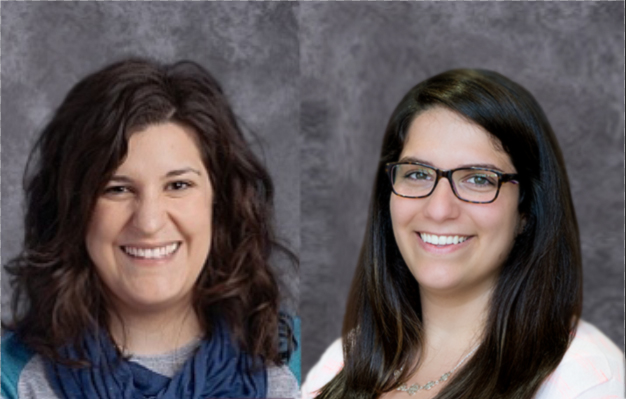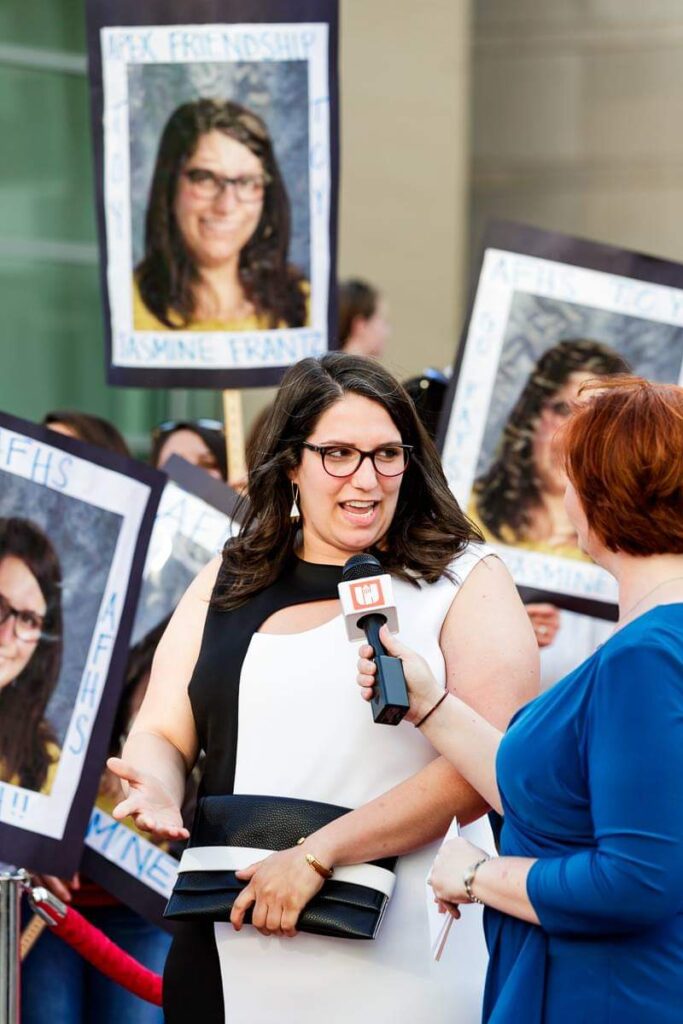
Jasmine Frantz ’13 and Sara Taormina Scanlon ’12 both had teachers in high school who made such a positive impact on their lives, they were inspired to pursue teaching careers.
Frantz and Scanlon are math educators in adjacent classrooms at Apex Friendship High School. Frantz teaches Math 1 and AP Calculus BC, while Scanlon teaches Honors Math 2, Trigonometry, Math 2 and serves as a member of the school’s improvement team, professional learning team leader, and advisor for the school’s National Honor Society chapter. Frantz and Scanlon enjoy teaching near one another, especially since they were both Park Scholars and members of the Math Education Club at NC State. “Having a common background and a friendship prior to working together eliminated some of the awkwardness that can occur when you welcome a new teacher to your department in a school,” Frantz says.

During the pandemic, Frantz and Scanlon have had to adapt their teaching methods to meet the needs of their students. “My biggest challenge has been not seeing the students. When students are physically in front of a teacher, the teacher is able to read their body language, often see their mood on their face, and ultimately read the room. So, I have had to adapt and now I am eliciting more verbal and written feedback from my students about my instruction. This was a little weird at first, but it has made a huge difference in our virtual classroom,” says Frantz.
Scanlon agrees, saying that virtual learning has made it harder to build relationships with her students and it has been a challenge to redesign the delivery and assessment of the content she is teaching. Frantz remarks that the experience as a whole has made her a more reflective teacher and inspired her to implement new teaching strategies in order to ensure the success of her students. “Is a virtual classroom frustrating for both students and teachers at times? Yes. However, at the end of the day, students are still learning. In my book, that is a success.”
When Frantz was in high school, she wasn’t quite sure what profession she wanted to pursue. It wasn’t until she was interviewing for the Park Scholarships program that she realized what career she wanted to pursue. “At the end of my interview, one of the interviewers turned to me said, ‘Based on how much you talked about the impact of your high school math teachers, your mother (who is also a teacher), and your beliefs on education, you are going to be a teacher.’ She was right. At that moment, I knew I was going to be a teacher,” Frantz recalls.
Scanlon, too, was inspired by teachers during her own time in high school. “Coach Goode and Mrs. Hudzik consistently demonstrated passion, not only for history, but for me. The coupling of their content mastery and genuine care for their students redirected my efforts from achievement and recognition to something greater: finding joy in learning. I felt a calling to do the same. If I could change the mindset of just one student, I would be doing something worthwhile with my time and talents.”
At NC State, Frantz and Scanlon both earned degrees in mathematics and secondary math education in the College of Education and the College of Sciences. Following her third year of teaching, Frantz participated in the Kenan Fellows Program for Teacher Leadership, a year-long program that includes a three-week summer internship with a mentor in a research or applied STEM setting and 80 hours of professional development builds leadership capacity and promotes curricular design bridging STEM at work with STEM at school.
“I worked with a team of mentors at Bayer Crop Science to learn about agriculture by exploring industry, business, and science perspectives. I experienced the lab, bee center, greenhouse, and more. Through the process, I created activities to increase student agricultural literacy, a mathematical project based learning unit, and shared best practices with professionals. This experience inspired me to make my math lessons more relevant to the future careers that my students could have one day.”
Scanlon says that experiences including SummerSTEM, Capturing Kids Hearts, and achieving her National Board Certification helped to push her out of her comfort zone and grow as an educator. In addition, Scanlon says that working with students from diverse backgrounds has helped her become a better teacher.
“My exposure to students of varied backgrounds, beliefs, and struggles has helped me grow as a teacher and mentor. My students have taught me how culture, mental health, and building relationships have a profound impact on their learning experience. They’ve taught me to be empathetic, kind, and more aware of the battles others could be facing.”
Sara Scanlon ’12
Both Frantz and Scanlon cite traveling abroad to the Czech Republic during their time at NC State as a significant experience. Frantz visited the Czech Republic for two weeks with a group of educators. “The NC State program focused on Czech culture and education. Our study was framed with technology projects that encourage connections with Czech educators, collections of Czech cultural artifacts, and reflections on Czech culture. This program allowed me to examine education through a global lens as opposed to a county or statewide lens.”
Scanlon says that studying abroad in Prague was a highlight of her college experience. “The Park Scholarships program supported my initiative to study abroad from the moment I mentioned interest. I was directed to important resources, encouraged to apply for a GRASP [now called a Park Enrichment Grant], and offered support in any way I needed. The aid of the Park Scholarships program made my plans to study abroad come to fruition.”
At NC State’s Prague Institute, Scanlon took courses in educational psychology and assessment design. “I visited schools throughout the country and had the privilege of teaching a few lessons. Being immersed in the culture, experiences, and values of a community so different from my own was a transformative experience,” she shares. “The opportunity to live and work with other NC State students at the Prague Institute was invaluable. We grew together and learned from one another, making the experience rich and rewarding.”
“I also look back fondly on my cohort of high school math education majors,” Scanlon explains. “Our small group truly bonded as we created lesson plans, endured critiques, and tackled the beast that is student teaching. I wouldn’t have been able to survive the journey without them, and I don’t think I would have enjoyed it nearly as much.”
Frantz and Scanlon both say that their experience as Park Scholars encouraged them to set professional development goals and pushed them outside of their comfort zones. Scanlon says that the Park Scholarships program allowed her to pursue her dream. “I am so grateful for my experiences as a Park Scholar, and I am the person I am today as a result of the opportunities the program afforded me.”
Scanlon explains that thanks to the Park Scholarship, she has been able to maintain a standard of living as a teacher without being encumbered by student loans.
“The blessing of having the means to pursue my dream career is not lost on me, and I will be forever thankful for the Park Scholarships program. I will continue to pay this investment forward by sharing my experiences, time, and talents with my students and my community.”
Sara Scanlon ’12
Scanlon advises current students to ask for help when needed and take care of their mental health. “You are valid. Your choices, hopes, identity — they’re all valid. Your mental health should not be a matter of shame. Needing help does not make you less than. Seeking help is dignified.”
Frantz encourages Park Scholars to take advantage of all of the opportunities that they have at NC State and the ones they have through the Park Scholarships program. “Build long-lasting relationships with professors and your classmates — you never know when you might need them in the future.”
“When you are deciding what to do after NC State, follow your passions and pick something that will make you happy.”
